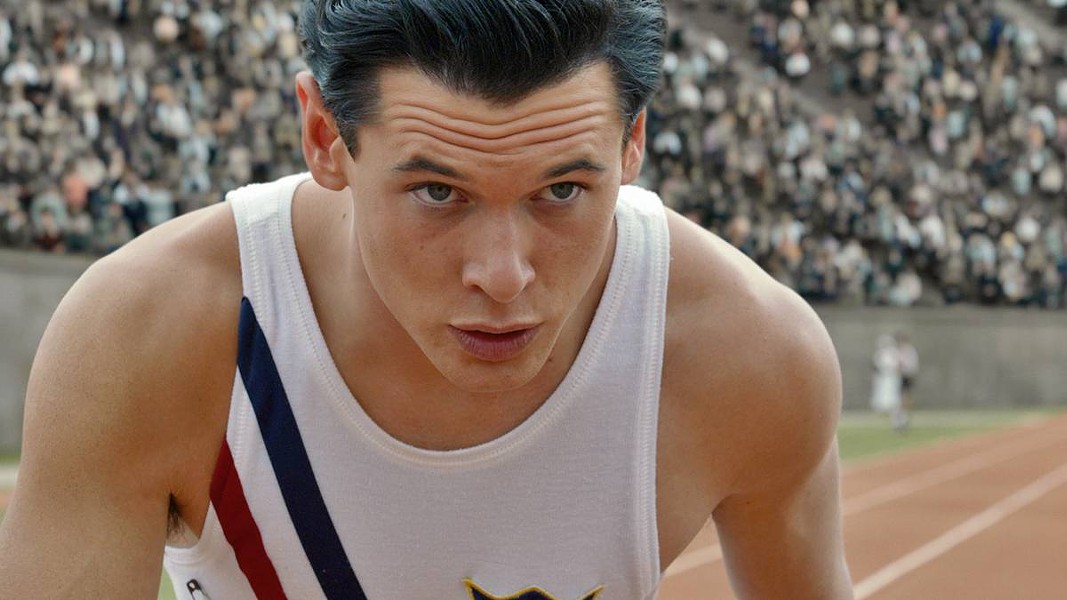Aside from the obvious, universally known classics, now and then a particular book or movie qualifies as a necessary work, something not only entertaining but instructive, a useful addition to the culture's knowledge of the world and itself. Although her "Seabiscuit," which suggested that a racehorse led America out of the Great Depression, succeeded both in print and on film, Laura Hillenbrand's "Unbroken" achieved a greater literary success, and the picture it inspired tells a far more compelling and important story.
Directed by Angelina Jolie, the movie deals with some of the same material as "The Bridge on the River Kwai," "King Rat," and most recently, "The Railway Man," the plight of World War II Allied POWs in Japanese prison camps. The astonishing epic of extraordinary suffering and more extraordinary courage confirms the truth of Mark Twain's dictum that life is indeed stranger than fiction, because life has no need to be probable.
The hero -- and for once, the word is appropriate -- is Louis Zamperini (Jack O'Connell), who served as a bombardier on a B-24 in the Pacific. Growing up in California, young Louis was something of a juvenile delinquent, distressing his immigrant parents with his record of fighting, drinking, smoking, and petty thievery. The picture shows his transformation into a high school distance runner who sets a national record for the mile and eventually wins a place on the Olympic team that competed in Germany in 1936.
Zamperini's past periodically enters the film's present in a series of relevant flashbacks that reveal his determination and tenacity, qualities that emerge in the most extreme circumstances. The first of those occurs when his barely airworthy plane crashes into the ocean, where he and a fellow crew member survive heat, hunger, thirst, exhaustion, sharks, and a strafing for 47 days, only to be capture by a Japanese ship, which takes them to Japan, initiating a prolonged ordeal of imprisonment.
In the prison camp, the men perform hard labor, all the while undergoing a constant series of insults, humiliation, and above all, torture. Apparently because of his athletic prowess, the commandant, whom the captives call The Bird (Takamasa Ishihara) for his erratic behavior, singles out Zamperini for special treatment. The Bird hopes to break his prisoner in body and spirit, subjecting him to endless beatings, punishing him for imagined disobedience and even for obedience, devising new ways to exercise his power and inflict suffering on his helpless, undernourished, weakened captive.
As the title suggests, Louis Zamperini refused to break, drawing on incredible reserves of courage to withstand the brutality and maintain some sense of personal integrity. He recalls the lessons of his youth, his determination to succeed on the track, the devotion of his family, his duty to his country and his comrades; mostly however, the extraordinary will he discovers in himself sustains him over two years of endless, excruciating pain.
Despite its length and the large cast, the picture really concentrates on only two men, the protagonist, Zamperini, and the his antagonist, The Bird. Jack O'Connell performs adequately as Zamperini, but rarely displays even a hint of variation in his character's actions and reactions; his weak whispery voice serves him poorly except in those moments when he recalls his family and his past, and displays the weakness he overcomes to remain unbroken. As The Bird, Takamasa Ishihara's pretty, boyish face and precise diction contrast nicely with his psychotic cruelty, which the book shows much more fully than the film.
Because it essentially settles into the prolonged conflict between the two men, "Unbroken" lacks the context of its protagonist's situation, showing almost nothing of the prisoners' days and nights, the ways they found to cope with an intolerable situation. The repetition of the torture, though entirely valid, grows increasingly difficult to bear; oddly the scenes of Zamperini and his crew inside their airplane under fire provide as much intensity and convication as anything in the film, no matter how true.
In the final scenes, the script summarizes the events that followed the victory over Japan and the fate of the two men. Named a war criminal, The Bird hid for years until the United States granted amnesty to all the torturers "in the interest of good relations." Some archival footage shows Louis Zamperini at the age of 80, back in Japan, an honorary member of the United States Olympic team, running joyfully through the streets with his teammates: unbroken indeed.
